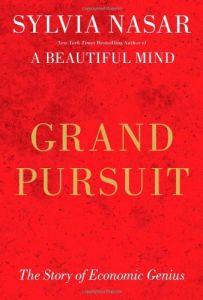Join getAbstract to access the summary!

Join getAbstract to access the summary!
Sylvia Nasar
Grand Pursuit
The Story of Economic Genius
Simon & Schuster, 2011
What's inside?
Economists are people, too, and some of them – despite what you may think – are downright fascinating.
Recommendation
Economists are people, too, as journalism professor Sylvia Nasar proves in her revealing book on the lives of the men and women who demonstrated “economic genius.” Starting with the 19th century and ending in modern times, she relates how writers, journalists, social activists and academicians turned the concepts of economics into practice. She delves into their personal lives to find the human aspects that informed their theories, while also weaving in the vivid historical settings that gave their lives context. From the tragedies of illness and death to the pangs of unrequited love, and even the scandals – one famous economist kept a “sex diary” – Nasar presents engaging, sometimes quirky portraits of the people behind the pronouncements. getAbstract highly recommends Nasar’s tracing of the history of modern human economic development – with its circling-back loops that mimic the booms and busts of the economies and societies her protagonists lived in – to those who love history, economics and a rousing good tale.
Summary
About the Author
Sylvia Nasar wrote A Beautiful Mind, the best-selling biography of economist John Nash. She is a professor at the Columbia Graduate School of Journalism.


















Comment on this summary